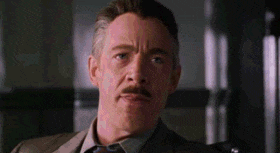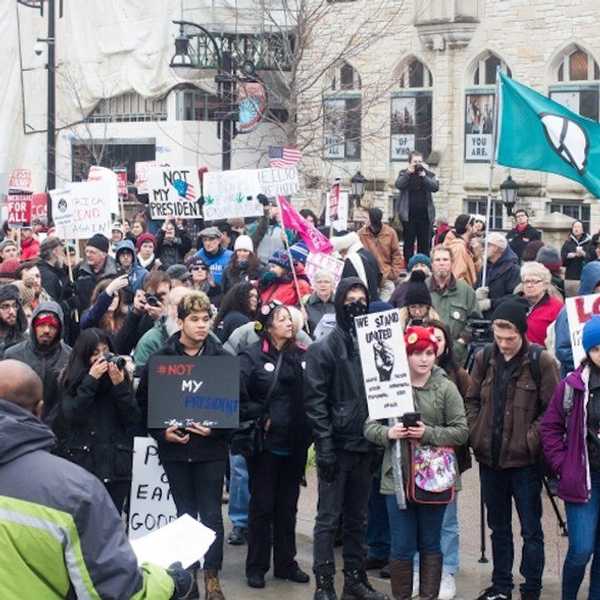Gun violence in America is a problem that no one can ignore. From Sandy Hook to the Orlando, mass shootings have taken the lives of many, and often the shootings target minority groups (Charleston and Orlando). However, the problem runs much deeper. According to The American Journal of Medicine, Americans are 10 times more likely to be killed by guns than people in other developed countries.[1] The question is: What do we do about it? More importantly, what will Donald Trump do about it and is his plan effective?
Wait is that even a question?
[Credit: ComicVine]
While there are a few points Donald and I agree on – infrastructure, for example – this is not one of them. First, his plan to reduce gun violence is based on a failed plan and is deeply rooted in anti-Black racism. Second, his understanding of the background check system is deeply flawed and lastly, his attribution to mental health problems creates a false image of disabled people.
[Credit: Tenor]
Donald Trump has a full analysis of his position on gun rights, which you can see right here.[2] He begins by acknowledging the problem of gun violence, specifically citing Baltimore and Chicago, and says that the model for stopping such violence is Project Exile. Project Exile was a crime-reduction program that did majorly reduce crime in Richmond, Virginia around 15 years ago.[3] (Side note: Trump claims it was reduced by 60% - the correct number is 32%). However, the question is: Was Project Exile the most effective method to reduce crime and what were its side effects? On a second look, this plan is a throwback to the racist “tough on crime” era of the 1990s and, oddly enough, was already tried on a national scale during the Bush administration and failed.
In “In The Shadow of Exile,” Carl Bialik, a writer for FiveThirtyEight, provides a detailed analysis on whether Project Exile worked, and offers plenty of evidence suggesting that it was not the resounding success gun-rights proponents claim it to be. This program followed the larger trend of “getting tough on crime” in the late 1990s and was picked up by other cities and the Bush administration in the form of “Project Safe Neighborhoods.” The program cost over $2 billion dollars, but by many measures it did not succeed. Crime rates did not fall in many cities that implemented similar programs, and the crime rates that did drop did so in alignment with the national trend of lower crime rates through the beginning of the 2000s. In fact, further evidence was revealed later that even in Richmond, the 32% reduction in crime might not have even been the result of Project Exile.[4] Of course the statistics do say that there was a reduction in crime that can be attributed to such “tough on crime” policies, but the harshness of a program that transports violent and non-violent criminals to far-away prisons without any chance at parole must be weighed against the benefits of a slight reduction in crime. It becomes clear that the level of racism and ignorance on the reasons for committing crimes in such a program greatly outweighs the possible net benefits.
One story that strikes at the very heart of the problem with Project Exile was presented in the same article, and it is the story of Juma Sampson, a Black American who was sentenced under Rochester’s version of Project Exile to 25 years in a far-away prison for selling drugs and dating someone who possessed an illegal firearm. Notice that he did not even commit a violent crime – a mandatory minimum of 20 years was there for drug charges. Upon reflection, Sampson said that the tough-on-crime policy would not have deterred him because “he did it to help feed his little sister,” since he could, at best, only work a part-time job. This exactly points out the problem with the program. It punishes non-violent crimes and disproportionately affects those of color. One of the major components of such a program is that it is tough on drugs, which we can believe is part of Trump’s plan considering he chose Jeff Sessions for Attorney General who, according to a co-worker, once said the KKK was “OK, until he learned that they smoked marijuana.”[5]
Make no mistake – this is a sign of racism that has propped up and validated the prison industrial complex that does nothing to actually reduce crime, but does a lot to lock up Black Americans. The policy has all the hallmarks of racist policing. It focuses on the cities such as Baltimore and Chicago, specifically the inner city, where poor Black Americans were systematically forced into while White Americans got to move out into the suburbs thanks to racist implementations of otherwise positive laws, such as the GI Bill.[6] It gets "tough on crime" by expanding enforcement of mandatory minimums on drug offenses, which has proven to disproportionately target and arrest Black Americans, even though White and Black Americans sell and consume drugs and similar rates.[7] This makes it abundantly clear that Donald Trump’s policy criminalizes Blackness and does little to actually reduce crime rates, aside from citing statistics that show correlation but almost no causation.
The next part of Donald Trump’s gun policy is the background check system. The problem here is insanely easy to point out. Trump said “Study after study has shown that very few criminals are stupid enough to try and pass a background check – they get their guns from friends/family members or by stealing them.” This is ALMOST right.
[Credit: Tenor]
It is true that a lot of the time mass shootings and gun crimes are committed with guns obtained without the necessary background check – the problem is that they obtain the firearms legally. Trump’s mistake is that he assumes going through a background check is already the legal process, but this is simply not the case. One of the major problems with gun violence is that mass shootings happen all the time in the U.S., while Australia has only had one in the past twenty years, for example. According to a study conducted by Mother Jones, compiling evidence from mass shootings since the 1980s, around 80% of firearms used in mass shootings were obtained legally.[8] In fact, even guns that are illegal in cities such as Chicago are obtained legally because of lax gun laws in nearby places such as Indiana – where you do not have to go through a background check, according to Al Jazeera.[9] Therefore, by using the statistic Trump gave himself and citing cities he himself cites, we can easily see that simply expanding the background check system, like Democrats have proposed for so long, can close out routes that criminals use to get guns. No one is claiming that this is the ultimate solution to all gun violence, but making it harder for criminals to obtain firearms has proven to go a long way in significantly reducing crime in other countries and does not have the downside of arresting non-violent offenders and punishing people in cruel and unusual ways. Moreover, this policy avoids the retributive nature of criminal justice that has proven to do almost nothing to prevent crime.
This leaves us with the last part of Donald Trump’s policy – investment in mental health services. Don’t get me wrong – investment in helping disabled Americans who are too-often ignored is great, but the way Donald Trump goes about it discriminates heavily against disabled Americans. According to a study in the National Library of Medicine and the National Institute of Health, completely eliminating the effects of mental illness would reduce gun violence by a whopping 4%.[10] The question is – why do Donald Trump and gun-rights proponents rush to fix mental health after a shooting? Ableism. The effects are obvious – it gives the impression that mentally disabled Americans are inherently dangerous, when this simply isn’t the case, and has the added boon of distracting Americans from the real issue, easy access to guns in most of this country..[11]
Donald Trump’s gun policy misses the point of gun violence in the United States. He advocates for a racist, tough-on-crime, policy that has been proven to be ineffective, does not support expanding background checks, while using evidence that would suggest otherwise, and blames disabled Americans. It is our job to not fall for the false narratives of the dangerous disabled person or the dangerous Black American and stand up to fight for real gun reform.
[1] Grinshteyn, Eric; Hemenway, David; “Violent Death Rates: The US Compared with Other High-income OECD Countries;” (2010); Clinical Research Study, The American Journal of Medicine; School of Community Health Sciences, University of Nevada-Reno, Reno PhD; Harvard School of Public Health, Boston, Mass. PhD; Accessed on December 13, 2016; http://www.amjmed.com/article/S0002-9343(15)01030-...
[2] Trump, Donald; “Second Amendment Rights;” (2016); President-Elect; Twitter maniac, probably going to be our last president; Accessed December 13th, 2016; https://assets.donaldjtrump.com/Second_Amendment_R...
[3] Zadronzy, Brandy; “Donald Trump’s Big Gun Idea? Literally Stolen From Tim Kaine;” (August 11th, 2016); The Daily Beast, Accessed on December 13th, 2016; http://www.thedailybeast.com/articles/2016/08/11/d...
[4] Bialik, Carl; “In the Shadow of Exile;” (Circa 2016); FiveThirtyEight; Accessed on December 13th, 2016; http://fivethirtyeight.com/features/homicide-in-ro...
[5] Zamost, Scott; “Jeff Sessions Dogged By Old Allegations of Racism;” (November 18th, 2016); CNN; Accessed on December 13th, 2016; http://www.cnn.com/2016/11/17/politics/jeff-sessio...
[6] Coates, Ta-Nehisi; “The Case for Reparations;” (June, 2014); The Atlantic, Probably more qualified than you; definitely more qualified than me; http://www.theatlantic.com/magazine/archive/2014/0...
[7] Denvir, Daniel; “The Truth About Mandatory Minimums: The Left’s Painful – but Necessary – Conversation About Crime and Punishment;” (October 29th, 2015); Salon; Accessed on December 14th, 2016; http://www.salon.com/2015/10/29/the_truth_about_ma... but_necessary_conversation_about_crime_punishment/
[8] Chuck, Elizabeth on Mother Jones Study; “More Than 80% of Guns Used in Mass Shootings Obtained Legally;” (December 5th, 2015); MSNBC; Accessed on December 13th, 2016; http://www.msnbc.com/msnbc/most-guns-mass-shooting...
[9] Schuessler, Ryan; “Lax Gun Laws in Indiana Fuel Violence in Chicago;” (January 11th, 2016); Al Jazeera America; Al Jazeera English; Accessed on December 13th, 2016; http://america.aljazeera.com/articles/2016/1/11/la...
[10] Swanson, Jeffrey W; McGinty, E Elizabeth; Fazel, Seena; Mays, Vickie M; “Mental Illness and Reduction of Gun Violence and Suicide: Bringing Epidemiologic Research to Policy;” (May 25th, 2015); All PhD; National Institute of Health, National Library of Medicine; Also probably more qualified than you, me and Donald Trump; https://www.ncbi.nlm.nih.gov/pmc/articles/PMC42119...
[11] The Editorial Board; “Don’t Blame Mental Illness for Gun Violence;” (December 15th, 2015); The New York Times; Editorial; Accessed on December 13th, 2016; http://www.nytimes.com/2015/12/16/opinion/dont-bla...
























